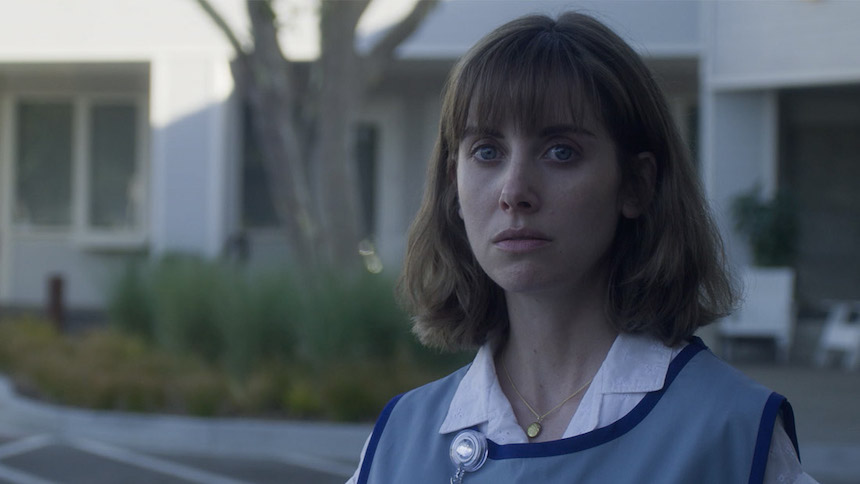Sundance 2020 Review: HORSE GIRL Gives Alison Brie the Role of Her Career
Actress and co-writer Alison Brie combines forces with director and co-writer Jeff Baena for a consistently intriguing, occasionally brilliant, black comedy.

In Jeff Baena (The Little Hours, Joshy, Life After Beth) and Alison Brie’s Horse Girl, a consistently intriguing, occasionally brilliant, black comedy that also stars Brie (in a rare dramatic turn) as the title character (metaphorical, not literal), Sarah, a semi-slacking thirty-something woman in the middle of a gradual, inexorable slide into a seemingly irrevocable mental breakdown and institutionalization in a world (ours) that has little room and even fewer resources for men and women suffering from severe forms of mental illness (USA Edition).
That critique of our near-absent social safety net, however, is, at best, tangential to Baena and Brie’s thematic and narrative goals: Horse Girl keeps Sarah and her increasingly fractured experiences, consistently front and center, restricting our perspective to her warped, limited point-of-view as her already tenuous grip on objective reality slips further and further from her grasp.
At least at first, there’s little, if anything, that can be described as out of the ordinary or extraordinary about Sarah. (Brie decidedly plays her character as unglamorous, eschewing all but the simplest of makeup for Sarah.) She diligently works as a salesperson in a crafts store, impressing customers with her deep-cut knowledge of the stores wares, commiserates freely with stand-in maternal figure, Joan (Molly Shannon), at work, and otherwise leads a dull, uneventful life overflowing with nightly reruns of a third- or –fourth-rate Supernatural rip-off, Purgatory (co-starring Matthew Gray Gubler and Robin Tunney in archly campy mode), and visits the horse she once owns at a local horse farm (thus the title).
She also has a more superficially stable, transaction-oriented roommate, Nikki (Debby Ryan, Insatiable, Jessie), who passively tolerates Sarah’s introspective, anti-social behavior in exchange for Sarah’s half of the monthly rent. Sarah’s birthday, however, serves as a catalyst for Nikki, forcing Sarah to celebrate with Nikki’s boyfriend and his roommate, Darren (John Reynolds, once again channeling his inner Jason Segel).
Even as Sarah’s life seems to take a turn towards socially and culturally defined normality (i.e., a romantic relationship with a like-minded soul), she’s troubled increasingly by chaotic, disordered dreams involving a stranger/not-stranger, Ron (John Ortiz), another woman, and what appear to be aliens. She also starts to suffer bouts of “lost time,” an initial indicator that like her mother and grandmother before her, her mental and emotional circuity has started to deteriorate.
That worry or anxiety of mental illness passed between generations due to genetic or other dispositions, accelerates Sarah’s impending breakdown. The dreams become more intense, the seepage between objective and subjective reality intensifies, leaving Sarah and everyone around her slightly perplexed at best, deeply concerned at worst. Baena and Brie (she co-wrote the script), deftly shift tones from drama to comedy, to drama again, often with an absurdist, surreal touch even as Sarah’s behavior inexorably slides towards self- or other-harm.
Horse Girl contains surprisingly strong parallels to a little known/little-seen 2005 South Korean film, Save the Green Planet!, up to and including the possibility that the lead character’s delusion (alien abduction) may, in fact, be “real” inside the film. Where, however, Save the Green Planet! shifts tones, moods, and genres with dizzyingly abrupt speed (a South Korean specialty), Horse Girl takes a more measured, balanced, ultimately more ambiguous approach.
Going with ambiguity – specifically an ambiguous, double-sided ending – can be risky, even alienating, especially for audiences expecting a clear answer to Horse Girl’s central, story-related question, but it’s one that will pay off for open-minded audiences, especially those who embrace interpretative ambiguity of the old-school, European Art Cinema kind.
Ambiguity aside, Horse Girl succeeds or fails primarily on Brie’s performance as the troubled, ultimately broken Sarah. Typically, Brie has played broader, caricature-adjacent characters mostly on the small screen (GLOW, Community) and occasionally the big one (The Little Hours, How to Be Single). Those characters tapped into a relatively small percentage of her acting range or talent.
Here, she’s able to fully access her talents, taking Sarah through the many, manic stages of delusion, from mostly balanced to mostly unbalanced, from superficially stable to most definitely unstable (and all points in between). It’s less a performance of sharp contrasts than of dynamic range. Brie’s performance in Horse Girl bodes well for future dramatic or semi-dramatic roles. She might, though, have to write or co-write those roles for herself as she did here with Horse Girl.







